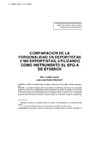Identificador persistente para citar o vincular este elemento:
https://accedacris.ulpgc.es/jspui/handle/10553/74059
| Título: | Comparación de la personalidad en deportistas y no deportistas, utilizando como instrumento el EPQ-A de Eysenck | Autores/as: | Guillén García, Félix Castro Sánchez, José Juan |
Clasificación UNESCO: | 241106 Fisiología del ejercicio | Palabras clave: | Personalidad Atleta- No atleta Cuestionario de Personalidad Estudio comparativo Sexo, et al. |
Fecha de publicación: | 1994 | Publicación seriada: | Revista de Psicologia del Deporte | Resumen: | Los estudios realizados sobre la personalidad en poblaciones deportivas han sido bastante
abundantes, sobre todo los desarrollados desde la perspectiva de rasgos, sin embargo la controversia
existente, producto de los resultados obtenidos, no ha sido aún disipada. Concretamente, en nuestro país
los estudios realizados sobre este particular han sido realmente escasos producto, tal vez, del incipiente
desarrollo de la Psicología del Deporte. Nuestro objetivo en el presente trabajo es comparar las puntuaciones obtenidas por distintas submuestras de mujeres y hombres, tanto deportistas como no
deportistas, en el cuestionario de personalidad EPQ-A de Eysenck. El análisis de los resultados apoya la
idea de que no existen diferencias estadísticamente significativas entre los cuatro grupos o submuestras,
en los factores de extraversión (E), estabilidad emocional o neuroticismo (N) y dureza o psicoticismo (P).
Se concluye en la necesidad de profundizar en este tema, utilizando para ello otros instrumentos que
hayan sido adaptados a la realidad deportiva, aunque tampoco se desecha la posibilidad de insistir en su
estudio con instrumentos como el 16PF o el MMPI. There have been many researchs made on Athletes´ personality, mainly those carried out from the trait perspective; however the existing controversy, product of the results obtained, has not been removed yet. Particularly, researchs made in our country about this matter have been limited, due to, perhaps, the incipient development of the Sport Psychology. Our aim in this study is to compare the scores obtained from different sub-samples of male and female athletes and non athletes in the Eysenck´s EPQ-A personality inventory. The analysis of the results supports the idea that there are not statistically significant differences among the four groups or sub-samples in extraversion factors (E), emotional stability or neutoticism (N) and toughness or psicoticism (P). It is concluded that it is necessary to go deeply into the matter, using, to this end, other instruments which have been adapted to sports reality, although the possibility of insisting in a research using instruments as the 16PF or the MMPI is not rejected. |
URI: | https://accedacris.ulpgc.es/handle/10553/74059 | ISSN: | 1132-239X | Fuente: | Revista de psicología del deporte [ISSN 1132-239X], v. 3 (1), p. 5-15 | URL: | http://dialnet.unirioja.es/servlet/articulo?codigo=2940621 |
| Colección: | Artículos |
Visitas 1
617
actualizado el 15-ene-2026
Descargas
481
actualizado el 15-ene-2026
Google ScholarTM
Verifica
Comparte
Exporta metadatos
Los elementos en ULPGC accedaCRIS están protegidos por derechos de autor con todos los derechos reservados, a menos que se indique lo contrario.
